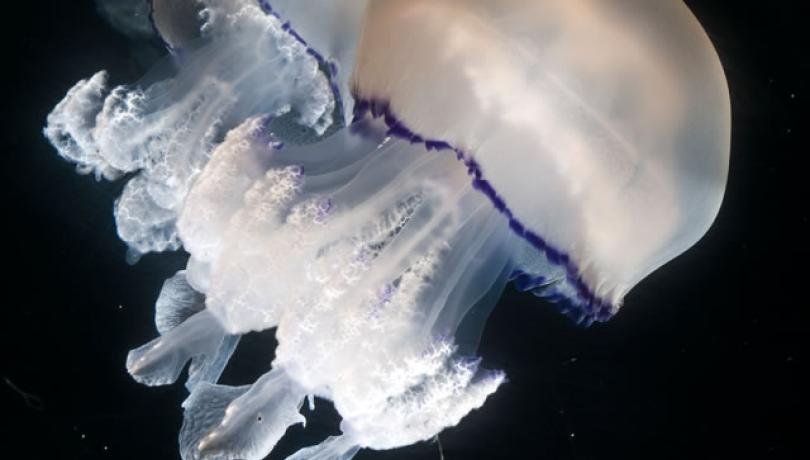The project aligns with circular economy and zero-waste policies, and will establish partnerships with the fishing sector, the Ministry, and the European Union.

The Institute for Research in Environment and Marine Science at the Catholic University of Valencia (IMEDMAR-UCV) and the Institute of Marine Sciences (ICM-CSIC) have launched the research project 'Jellyfish Collagen: an Innovative Resource from the Mediterranean in Blue Biotechnology (COLMED)', which aims to promote the use of jellyfish as a sustainable source for the development of biomaterials in the field of biomedicine. The initiative also seeks to mitigate the socio-economic impacts caused by jellyfish blooms on the tourism and fishing sectors.
The barrel jellyfish (Rhizostoma pulmo) and the 'fried egg' jellyfish (Cotylorhiza tuberculata) are highly abundant species in the Spanish Mediterranean, frequently appearing in the bycatch of artisanal fishers. These species are known in the scientific community for their high collagen content. The elevated temperatures recorded in the Mediterranean in recent years and other factors have contributed to their increase.
For this reason, according to José Tena, principal investigator of the project and director of IMEDMAR-UCV, the aim is to promote collagen derived from jellyfish as an innovative raw material for applications and products that "significantly improve the well-being and health of future generations in biomedicine, nutraceuticals, and cosmeceuticals". Furthermore, its use is a sustainable alternative to collagen derived from the skin and bones of terrestrial mammals, such as cattle and pigs.
Additionally, jellyfish blooms have increased in frequency and intensity in recent decades due to climate change and overfishing. One of the most affected sectors is fishing, as the obstruction of fishing gear and nets, the death of catches, longer fishing times, and fuel consumption impact artisanal fishers operating close to the coast with small vessels, using nets such as gillnets and trammel nets, among others. Therefore, Ainara Ballesteros, a researcher at IMEDMAR-UCV, advocates for using these accidental jellyfish catches: "We cannot waste this valuable resource, especially within the framework of circular economy and zero-waste policies," she states.
Moreover, due to the changes observed over the years in the life cycles and population dynamics of jellyfish, the COLMED project will collaborate with the marine citizen science platform 'Observadores del Mar' and the 'Jellyfish Alert Project' to complement the database on the presence and absence of these organisms in the Valencian Community and Catalonia, analysing population trends in the context of climate change.
"The adult phase of these species used to occur between July and September, but now we are seeing them from April to November," notes ICM-CSIC researcher Macarena Marambio.
Partnerships with the fishing sector, the Ministry, and the European Union
The COLMED research team will collaborate with the fishermen’s guilds of Moraira and Jávea in the Valencian Community and those of El Port de la Selva, Cadaqués, and Roses in Catalonia. The guilds will be responsible for catching, collecting, and storing the jellyfish. Training sessions will be held to develop resource management plans agreed upon by both parties, ensuring the integrity of the catches during biotechnological processes. “In recent years, fishermen from some guilds have asked us if we could use the jellyfish they catch as an alternative resource to complement their income,” points out Josep-Maria Gili, researcher at ICM-CSIC.
The COLMED project is being developed in collaboration with the Biodiversity Foundation of the Ministry for the Ecological Transition and the Demographic Challenge, through the Pleamar Programme, and is co-funded by the European Union via FEMPA (European Maritime, Fisheries and Aquaculture Fund).